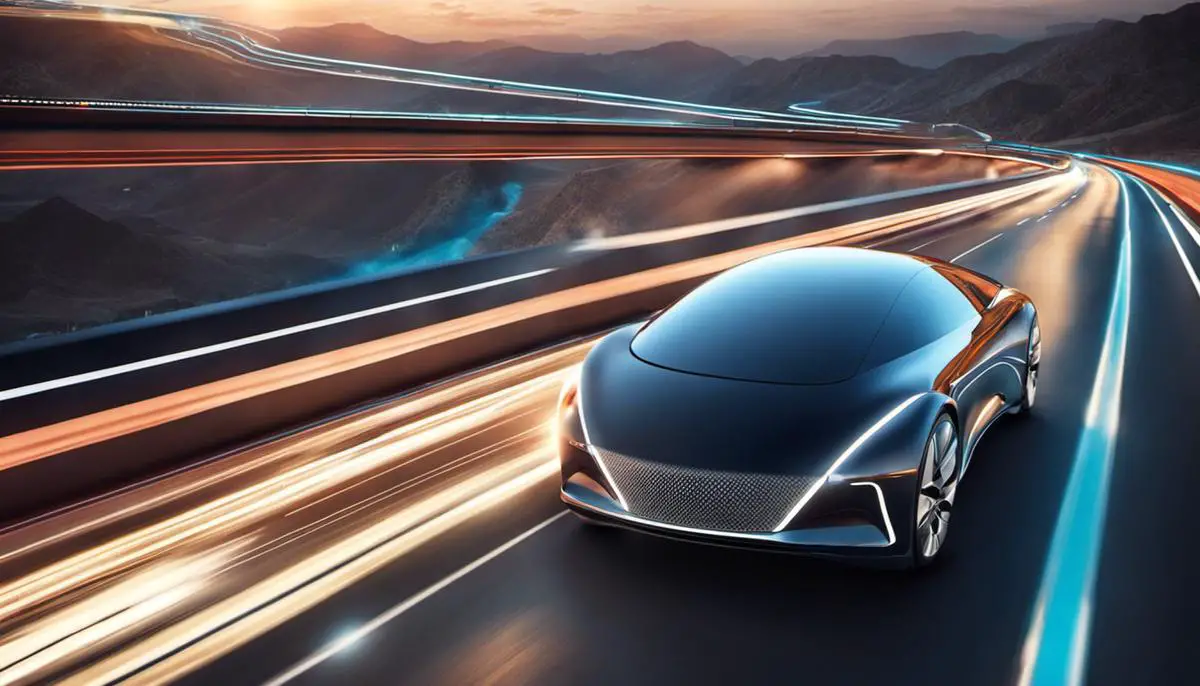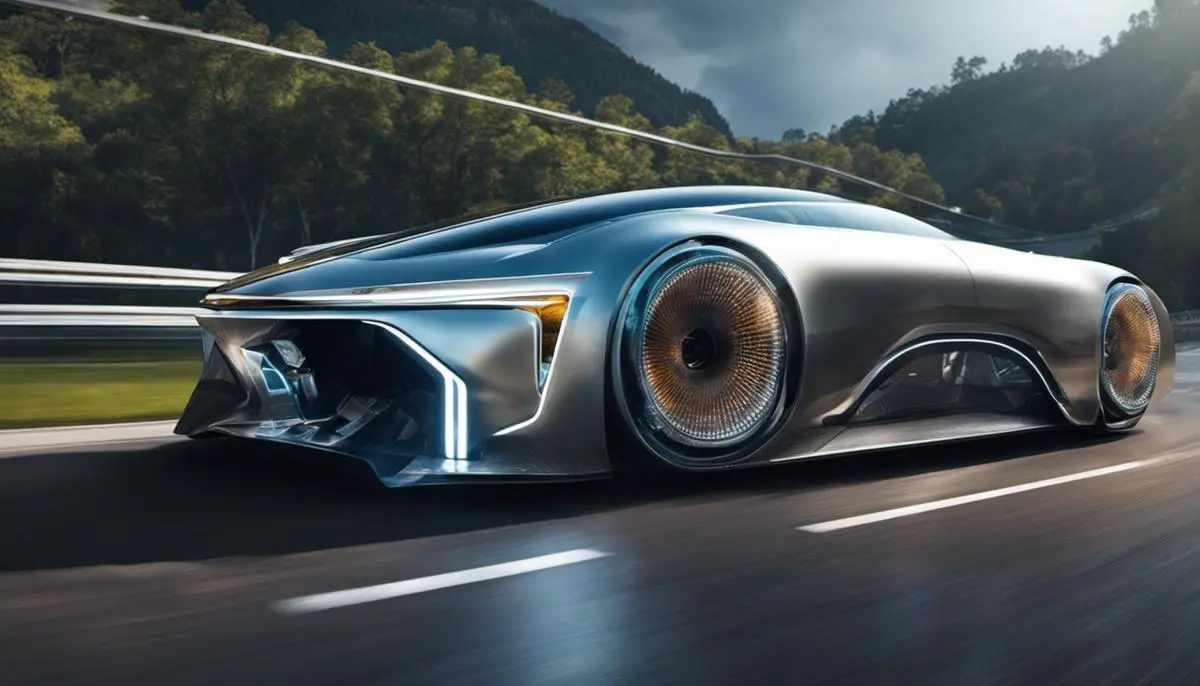Exploring AI in Modern Vehicle Design
In today’s fast-paced and highly technological world, Artificial Intelligence (AI) shapes groundbreaking innovations, transforming all major industries, including the automotive sector. Contemplating a future where our cars operate importantly on AI isn’t bizarre anymore. Quite the contrary; it’s becoming an imminent reality. This essay presents an in-depth exploration of the enthralling world of AI in vehicle design and technology, discussing its purpose, the advancements it has engineered, and the impact it has effectuated on the automotive industry. Looking ahead, we endeavour to glimpse into the prospective direction of AI in vehicle design, stepping into the realms of autonomous cars, predictive maintenance, and many more revolutionary concepts.
Understanding AI in Vehicle Technology
Artificial Intelligence and Smart Vehicle Design
Artificial Intelligence (AI) technology has revolutionized the design and operation of vehicles in recent years, making them smarter, safer and more efficient. AI systems in vehicles are designed to make advanced decisions based on a massive collection of real-time data rendered from a myriad of sensors installed in the vehicle. This can include data related to driver behavior, road conditions, weather and other vehicles on the road.
Automated Driving
Automated driving is one of the most exciting advancements in vehicle technology made possible by AI. These self-driving vehicles utilise machine learning, a branch of AI, to adapt and learn from their environment. By collating data from sensors, radars, and cameras, these vehicles can recognize obstacles, interpret traffic signals, and even predict pedestrian movement. The increased use of AI in these self-driving cars aims to reduce accidents caused by human error and improve road safety.
Predictive Maintenance
Another significant application of AI in vehicle design is predictive maintenance. Through AI techniques such as data-mining, statistical analysis and machine learning, the systems can predict possible defects or malfunctions in the car based on historical and real-time data. This technique enables preventive maintenance that can save time and money and significantly extend the life of the vehicle.
Voice Recognition
Voice recognition technology in vehicles has advanced significantly over the past decade. Cars can now process and understand natural language due to AI’s capabilities to comprehend and learn different syntaxes, accents, and nuances in human language. This allows drivers to control numerous aspects of the vehicle, such as the navigation system, temperature controls, and entertainment systems, without losing focus on the road.
Intelligent Navigation Systems
Intelligent navigation systems equipped with AI capabilities have greatly improved the driving experience. By processing real-time data from various sources, the navigation system can provide optimized routes, alternative paths during heavy traffic, and estimated times of arrival. Some systems can even identify fuel-efficient routes and provide real-time weather updates.
In Summary
As we look towards the future of automotive design, it becomes increasingly clear that Artificial Intelligence (AI) is a key player. This technology is so much more than a novelty – it is creating safer, more efficient vehicles and revolutionizing the driving experience. Breakthroughs in AI are not only leading to exciting developments in self-driving cars and electric vehicles, but they’re also enhancing everyday driving with predictive maintenance, voice recognition, and intelligent navigation. The influence of AI in vehicle design and transport is significant, reshaping our understanding of what is possible.

Advancements of AI in Vehicle Design
AI Influence on Vehicle Safety
One of the most profound effects of AI in vehicle design is its emphasis on safety. Consider advanced driver assistance systems (ADAS) for example. Fueled by AI, these systems guard driver and passenger safety with features like adaptive cruise control, automated emergency braking, and lane-keeping assistance. Such safety improvements rely on AI’s capacity to analyze large sets of data in real-time, which in turn enables desirable vehicle responses to different driving conditions.
One notable example of this safety focus is Tesla’s Autopilot system. By integrating cameras, radar, ultrasonic sensors and AI software, Tesla has produced cars that can navigate, change lanes, park, and even prevent collisions autonomously. This is an impressive embodiment of how AI is making driving safer.
AI’s Role in Vehicle Performance Enhancements
AI continues to transform vehicle performance by enabling predictive maintenance, optimizing performance attributes, and enhancing driving dynamics. Predictive maintenance uses AI to analyze data from in-vehicle sensors to monitor components’ health and predict potential mechanical issues. This helps mitigate any vehicle downtime, saving both time and money for owners.
For example, the Predictive Maintenance feature by BMW uses AI to identify when service is required. It provides notifications to the driver and can automatically schedule service appointments when necessary.
AI also optimizes performance attributes. For example, the recent AI software upgrade in the Tesla Model S increased the vehicle’s range, all without external modifications. This was achieved through AI’s optimization of battery charging and power use.
Energy Efficiency and Sustainability through AI
AI can also help design vehicles that are more energy-efficient. AI algorithms, for instance, can produce vehicle designs that maximize aerodynamics, thereby reducing drag and fuel consumption. AI techniques can optimize powertrain control strategies for hybrid and electric vehicles to enhance energy efficiency and extend the vehicles’ range.
A fantastic example of AI’s contribution in this area comes from Geely. The Chinese car manufacturer has used AI to develop a lightweight, fuel-efficient concept vehicle. AI algorithms helped optimize the design for weight reduction, which resulted in improved fuel efficiency.
There’s no doubt that Artificial Intelligence is reshaping the landscape of vehicle design, impacting elements such as safety, performance, and energy efficiency. The continuous evolution of AI technology promises a future where vehicles are not only smarter and safer, but also more economically sound and environmentally friendly.

Impact of AI on Automotive Industry
The Transformative Impact of AI on the Automotive Industry
Artificial Intelligence, commonly known as AI, is a substantial game-changer in numerous fields, with the automotive industry being one of them. Across the world, car manufacturers are capitalizing on the benefits of AI to enhance vehicle design and performance, boost safety measures, and enrich the overall driving experience.
Shifting the Landscape of Vehicle Design
AI significantly impacts the aesthetics, functionality, safety, and innovation in vehicle design. By analyzing vast amounts of data, producers can anticipate customer needs and preferences to create responsive designs, making AI an indispensable tool in the preproduction phase. Furthermore, AI simulators help in stress-testing designs under various conditions, which result in safer and more efficient automobiles.
Creating Economic Ripples in the Vehicle Market
AI has also been a substantial economic driver for the automotive industry. New avenues for revenue have been observed as car manufacturers and technology companies become increasingly intertwined. The focus has shifted from purely physical vehicle sales to providing services that center around car usage and driving data, thereby presenting new profitable opportunities. Moreover, the rise of autonomous vehicles driven by AI has created an entirely new market subset.
Changing Job Roles and Skills
AI’s impact has led to shifts in job roles within the automotive industry. With automation taking over repetitive tasks, the need for manpower in manufacturing processes has significantly reduced. However, this does not equate to job loss but rather a shift towards new skill requirements. As the industry incorporates more AI technology, there is a growing demand for experts in data analysis, machine learning, and AI programming.
Transforming Customer Experience
AI’s influence extends to the customer experience too. From the personalization of in-car experience to improving customer service, AI is changing the way businesses interact with their customers. AI-powered chatbots, for example, offer quick resolutions to customer queries, while machine learning algorithms tailor unique driving experiences based on individual driver preferences.
Ensuring Safety and Efficiency
System failures and human errors are the leading causes of accidents, and AI is being integrated into vehicle designs to combat these issues. Advanced Driver Assistance Systems (ADAS) like automatic braking, lane-keeping, and traffic jam assistance are prime examples of how AI in design can enhance safety. Furthermore, AI algorithms optimize fuel efficiency, improving vehicle lifespans and creating a more sustainable future.
AI in Manufacturing
AI is streamlining the manufacturing process in the automotive industry as well. Automated quality control, predictive maintenance, and smart supply chain management are some areas where AI has proven advantageous. These implementations reduce costs, increase production speed, and ensure a consistently high-quality output.
The Development of Autonomous Vehicles
Arguably the most significant advancement spurred by AI in the automotive industry is the development of self-driving vehicles. Through machine learning, these autonomous vehicles can learn from every trip they make, continually improving their performance. This revolution has far-reaching implications for personal transport, freight industry, city planning, and energy consumption.
The Future of AI in Automobiles
Remarkable strides have been made in the realm of Artificial Intelligence (AI), especially where automobile manufacturing and design are concerned. Their implications span from how vehicles are designed to their overall safety, efficiency, cost effectiveness, and even their influence on the job market. The future of automobiles, with AI at the helm, foresees a world where vehicles are not only more efficient and safe, but increasingly aligned with their operator’s needs.

Future Trends: AI and Vehicle Design
AI: Revolutionizing Vehicle Design
As technology advances, AI’s growing presence within the automotive industry is visibly changing the way vehicles are crafted. The last few years have seen remarkable strides in AI’s implementation in vehicle design, ushering in a new era of efficiency, sustainability, and unrivaled performance. Companies such as Tesla, Waymo, and Uber are amongst the pioneers embracing AI-led design in their future models, giving a glimpse of what’s to become of the future of transportation.Harnessing AI in Autonomous Vehicles
The proliferation of autonomous cars, also known as driverless cars, is one of the most visible ways that AI has influenced vehicle design. These smart vehicles use AI algorithms and sensors to decipher their environment, make decisions, and drive without human intervention. This revolutionary technology continues to advance, with ongoing research exploring more sophisticated AI functionality in autonomous vehicles. Current approaches include real-time decision-making software, advanced sensors for perception, and neural networks to power advanced prediction capabilities.AI in Vehicle Safety and Efficiency
AI also plays a significant part in enhancing vehicle safety and efficiency. Machine learning algorithms can learn from huge datasets, predict potential issues, and recommend design solutions that increase safety and fuel efficiency. Multiple cars, including electric vehicles, are now designed with advanced driver-assistance systems (ADAS). These AI-powered features, like lane departure warnings, adaptive cruise control, and automatic braking, are designed to help drivers avoid accidents.AI in Electric Vehicles
In the world of electric vehicles (EVs), AI serves as a key tool in designing more efficient and longer-lasting battery systems. AI algorithms help by predicting and optimizing battery performance based on usage patterns, environmental factors, and other parameters. The objective is to extend the vehicle’s range and the battery’s lifespan while improving safety and reliability.AI: Enhancing the User Experience
AI’s impact goes beyond the functional aspects of vehicle design. It also plays a part in improving the in-car user experience. For instance, AI is used in designing and programming infotainment systems, control interfaces, and personalized features. AI can learn drivers’ habits and preferences, personalize the driving experience, improve voice recognition, and optimize navigation routes.Future Insights: AI and Vehicle Design
While the adoption of AI in vehicle design has indeed revolutionized the industry, experts predict that we are only at the dawn of this transformative era. Future innovations might involve more AI-driven design tools, further development of autonomous and electric vehicles, AI-directed manufacturing processes, and even AI as co-pilot or co-designer. As research continues, the integration of AI in vehicle design is expected to yield cars that are safer, more efficient, and better equipped to serve the evolving needs of their users.
The evolution of artificial intelligence in the world of vehicle design and technology continues to push boundaries, blurring the edge between what’s science fiction and what’s reality. The future indeed holds an intense and exciting flux of possibilities. From the creation of more sophisticated autonomous cars to electric vehicles powered most predominantly by AI, the automotive industry is set to witness unprecedented transformations. The economic implications, job role shifts, and the overall change in the vehicle manufacturing landscape imply a profound evolution, spurred by AI. As technology continues to advance, and AI becomes increasingly formidable, the trajectory of these enhancements ensures an awe-inspiring future of the automotive industry, painted by the strokes of Artificial Intelligence.
Writio: The AI writing companion effortlessly crafts tailor-made, engaging content for blogs and websites. This article was composed with finesse by Writio.
